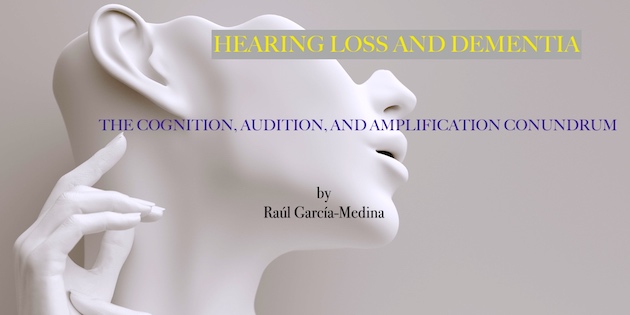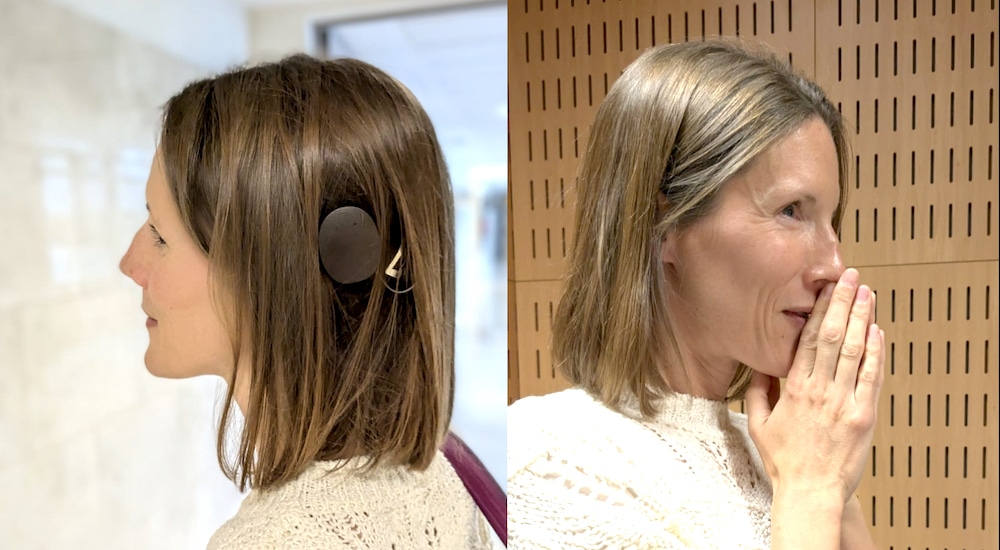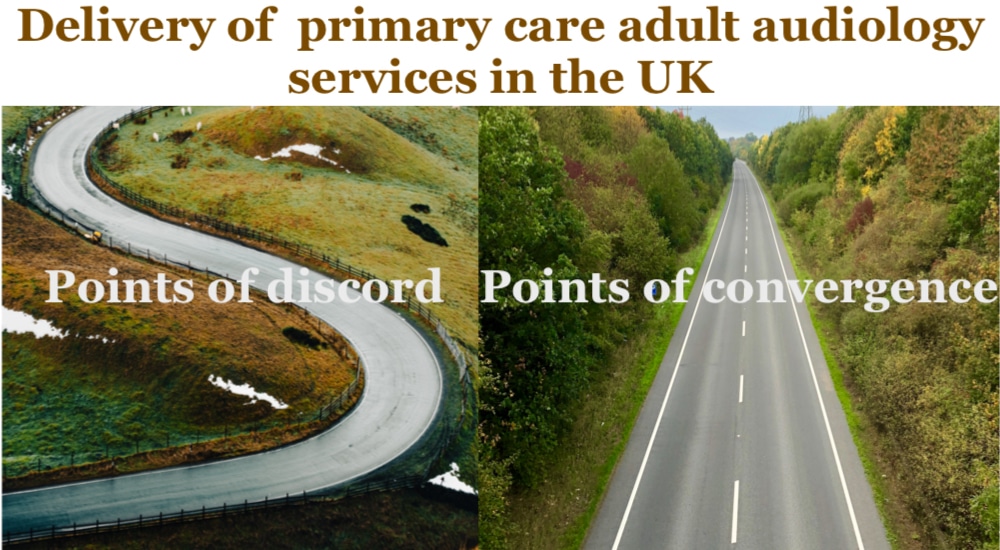THE COGNITION,AUDITION, AND AMPLIFICATION CONUNDRUM
Leading audiologist Raúl García-Medina provides a sturdy bundle of evidence and thought to underline the need to address hearing loss early and proactively to reduce the risk of cognitive decline.

There is no need to state here that hearing loss is a widespread and prevalent condition affecting millions of individuals worldwide.
It is not only a communication challenge,but can also have broad implications for overall health and well-being, including cognitive function. Recent research has established a link between hearing loss and cognitive decline, including an increased risk of developing dementia.
Studies have indicated that hearing loss has a causative effect on cognitive decline. One possible explanation for this link is the increased cognitive load placed on individuals with hearing loss. Individuals with hearing loss may need to expend more cognitive resources to process and understand speech and other sounds, which can lead to cognitive decline over time.
In addition, studies have also shown that untreated hearing loss is associated with accelerated cognitive decline.
One such study, called ACHIEVE (Age-Related CHIldhood Experiences and Vulnerability to Age-Related Diseases and Health Conditions), was conducted by the US National Institute on Aging. The study followed nearly 600 adults over the age of 50 for a period of 18 years, and found that individuals with hearing loss had a higher risk of developing dementia than those without hearing loss. This risk was found to be higher in individuals with untreated hearing loss compared to those who received hearing aids.
The study also found that the cognitive decline associated with hearing loss is not limited to memory or language, but also affects other cognitive domains such as attention and processing speed. This highlights the importance of addressing hearing loss early and proactively to potentially reduce the risk of cognitive decline and dementia.
There is another study by Frank Lin et al., currently ongoing, and also called ACHIEVE but this one stands for Aging and Cognitive Health Evaluation in Elders. This very important piece of research is a randomised control trial that started in 2018 and was designed to determine what hearing intervention best practice will best deal with reducing cognitive decline in older adults with hearing impairment. The study is being conducted by the John Hopkins Bloomberg School of Public Health. Their results should be available at the end of the year.
Raúl García-Medina: “Hearing aids can also help reduce the cognitive load associated with hearing loss, potentially reducing the risk of cognitive decline.
Hearing aids can potentially reduce cognitive decline risk.
Hearing loss has also been linked to an increased risk of depression, social isolation, and decreased quality of life. These factors further underscore the importance of addressing hearing loss as part of a comprehensive approach to overall health and well-being.
Fortunately, several interventions are available to address hearing loss and potentially reduce the risk of cognitive decline. The most common treatment for hearing loss is hearing aids, which have been shown to improve speech comprehension, cognitive function, and quality of life in individuals with hearing loss. And although this may apply to the vast majority of the population most of the time, it may not be true for a particular individual.
Hearing aids can also help reduce the cognitive load associated with hearing loss, potentially reducing the risk of cognitive decline. Recent research has found that the benefits of hearing aids extend beyond improving communication and quality of life.
A study conducted by Golub and colleagues (2019) found that individuals with untreated hearing loss had a faster rate of cognitive decline than those with treated hearing loss. The study also found that the rate of cognitive decline was slower in individuals who received hearing aid treatment compared to those who did not. However, more work is required to make causal statements.
Not just hearing aids, but also auditory training and speech therapy
In addition to hearing aids, auditory training is another intervention that has been shown to improve speech comprehension and cognitive function in individuals with hearing loss. Auditory training can help individuals improve their ability to process speech and other sounds, potentially reducing the cognitive load associated with hearing loss. Auditory training typically involves exercises and tasks designed to improve speech comprehension and sound localisation skills.
Speech therapy can also be beneficial for individuals with hearing loss, particularly those with speech discrimnation difficulties. Speech therapy can improve speech recognition and language processing in individuals with hearing loss. Speech therapy typically involves exercises and tasks designed to improve speech recognition and language processing skills.
Getty Images – Dr. After 123. The results of the ongoing US ACHIEVE trial (randomised control trial following 900 subjects and designed to determine what hearing intervention best practice will best deal with reducing cognitive decline in older adults with hearing impairment) may be along by the end of 2023.
More general health principles for aiding cognitive ability
Another intervention that may help address hearing loss and reduce the risk of cognitive decline is cognitive training. Cognitive training involves exercises and tasks designed to improve cognitive function, including attention, memory, and processing speed. Cognitive training may be particularly beneficial for individuals with hearing loss who are experiencing cognitive decline. Studies have shown that cognitive training can improve cognitive function in older adults and may also help reduce the risk of cognitive decline.
In addition to addressing hearing loss, there are several other lifestyle factors that may help maintain cognitive health. Regular physical exercise, a healthy diet, adequate sleep, social engagement, and cognitive stimulation have all been associated with better cognitive function.
At this particular point in time, when audiologists are expectantly following the rapid research developments that are taking place around these associations and patients are attending the clinics with a wealth of information already, it can be difficult to formulate statements that are empirically backed up to inform them on the current knowledge that exists without making false claims.
Below, you will find a 10-point statement list that could be used currently and safely in your clinic.
And to back up the statements in the list above, please refer to:
A recent study by Maharani et al. (2021) conducted a systematic review and meta-analysis of 36 studies and found a significant association between hearing loss and cognitive decline in middle-aged and older adults. Lin et al. (2011) conducted a meta-analysis of 40 studies and found a significant association between hearing loss and cognitive decline, particularly in older adults.
An article by Livingston et al. (2021) proposed that hearing loss may contribute to cognitive decline by increasing cognitive load, reducing sensory input, and impairing social engagement.
A longitudinal study by Dawes et al. (2021) found that hearing loss and cognitive decline were bidirectionally associated over a 25-year period.
A recent study by Zhan et al. (2021) found that older adults with untreated hearing loss had a higher risk of cognitive impairment and dementia compared to those with treated hearing loss or normal hearing.
A study by Amieva et al. (2015) found that individuals with untreated hearing loss had a higher risk of cognitive decline and dementia compared to those with normal hearing or treated hearing loss.
A systematic review and meta-analysis by Wolters et al. (2020) found that age-related hearing loss was a significant risk factor for cognitive decline and dementia, independent of other factors such as age, sex, and education.
A recent study by Gallacher et al. (2020) found that even mild hearing loss was associated with increased risk of cognitive decline and dementia over a 20-year period.
An intervention study by Ferguson et al. (2020) found that hearing aid use improved cognitive function and quality of life in older adults with hearing loss.
An intervention study by Amieva et al. (2018) found that hearing aid use improved cognitive function and slowed down the progression of coqnitive decline in older adults with hearing loss.
A recent study by Duggal et al. (2021) found that social isolation resulting from hearing loss was associated with increased risk of cognitive decline and dementia in older adults.
A systematic review and meta-analysis by Loughrey et al. (2021) found that treating hearing loss may help to slow down the progression of cognitive decline in older adults.
A study by Deal et al. (2021) found that regular hearing screenings and early intervention for hearing loss may help to prevent or delay cognitive decline in middle-aged and older adults.
Equally, a study by Lin et al. (2013) found that regular hearing screenings and prompt treatment of hearing loss may help to preserve cognitive function and improve quality of life in older adults.
If the patient presents to the GP and reports listening difficulties, these screenings should lead to a referral for further audiological investigations, irrespective of the outcome of the screening, to rule out suprathreshold disorders, as well as referrals to other associated specialties.
Source: Audiology News UK issue 01 March-April 2023





